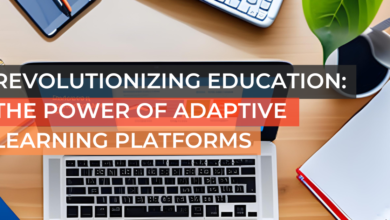Online Education: A Paradigm Shift in Learning
Contents
- 1 Greetings, Esteemed Readers
- 2 Introduction
- 3 Strengths of Online Education
- 4 Weaknesses of Online Education
- 5 Table: Benefits and Challenges of Online Education
- 6 FAQs About Online Education
- 6.1 What is online education?
- 6.2 What are the benefits of online education?
- 6.3 What are the challenges of online education?
- 6.4 Is online education as effective as traditional face-to-face education?
- 6.5 Is online education right for me?
- 6.6 How do I choose an online course or program?
- 6.7 What are the career prospects for graduates of online education programs?
- 7 Conclusion
Greetings, Esteemed Readers
Welcome to this in-depth exploration of online education, a transformative force reshaping the landscape of knowledge acquisition and skill development. As the digital age continues to permeate every aspect of our lives, online education has emerged as a powerful tool for lifelong learning, career advancement, and personal enrichment. In this comprehensive article, we delve into the intricacies of this dynamic learning model, examining its strengths, weaknesses, and profound implications for individuals and society as a whole.
Introduction
Online education, often referred to as e-learning or distance learning, is a pedagogical approach that utilizes digital technologies to deliver educational content and facilitate learning experiences. Unlike traditional face-to-face instruction, online education allows students to access educational resources and engage in learning activities remotely, at their own pace and convenience. This flexibility has made online education an attractive option for individuals seeking to enhance their knowledge and skills while balancing personal, professional, and academic commitments.
The history of online education can be traced back to the early days of the Internet. In the 1990s, universities and educational institutions began experimenting with delivering courses and programs online. As technology advanced and the Internet became more accessible, online education gained widespread adoption, transforming the educational landscape. Today, online education is a global phenomenon, with millions of students worldwide enrolled in online courses and programs.
The advantages of online education are undeniable: it provides greater accessibility, flexibility, and affordability compared to traditional education models. Online education breaks down geographical barriers, allowing students from remote areas or with busy schedules to pursue higher education. It also offers a wider range of courses and programs, giving students the opportunity to specialize in niche areas or acquire skills that may not be available in their local institutions.
However, online education is not without its challenges. One potential drawback is the lack of face-to-face interaction between students and instructors. This can make it difficult to build rapport and foster a sense of community among learners. Additionally, online education requires a high degree of self-motivation and time management skills, as students are responsible for setting their own schedules and pacing their studies.
Despite its limitations, online education has proven to be an effective and transformative learning model. It has empowered countless individuals to achieve their educational goals, advance their careers, and make a positive impact on society. As technology continues to evolve and the demand for online education grows, it is likely that this learning model will continue to play a significant role in shaping the future of education.
Strengths of Online Education
Accessibility: Online education breaks down geographical barriers, allowing students from all over the world to access high-quality educational resources and learning opportunities. This is particularly beneficial for students in remote areas or for those with busy schedules that make it difficult to attend traditional face-to-face classes.
Flexibility: Online education offers unparalleled flexibility, allowing students to study at their own pace and on their own schedule. This flexibility is particularly valuable for working professionals, parents, and individuals with other commitments that make it difficult to attend traditional classes.
Affordability: Online education is often more affordable than traditional education. This is because online courses and programs typically have lower overhead costs than traditional face-to-face classes. Additionally, online students can save money on transportation and other expenses associated with attending traditional classes.
Wider Range of Courses and Programs: Online education offers a wider range of courses and programs than traditional education. This is because online courses and programs are not constrained by physical space or time limitations. As a result, online students have the opportunity to specialize in niche areas or acquire skills that may not be available in their local institutions.
Personalized Learning: Online education allows for personalized learning experiences. Students can access learning materials and activities at their own pace and in a way that suits their individual learning styles. This can be particularly beneficial for students who require additional support or who want to accelerate their studies.
Convenience: Online education offers unmatched convenience. Students can access learning materials and activities from anywhere with an internet connection. This eliminates the need for students to travel to campus or to attend classes at specific times.
Weaknesses of Online Education
Lack of Face-to-Face Interaction: One potential drawback of online education is the lack of face-to-face interaction between students and instructors. This can make it difficult to build rapport and foster a sense of community among learners. Additionally, it can be more challenging to ask questions and receive immediate feedback from instructors in an online setting.
Requires Self-Motivation and Time Management Skills: Online education requires a high degree of self-motivation and time management skills. Students are responsible for setting their own schedules and pacing their studies, which can be challenging for some learners. Additionally, online students need to be able to stay motivated and focused without the structure of a traditional classroom setting.
Technical Issues: Online education relies heavily on technology, which can sometimes lead to technical issues. These issues can range from minor inconveniences, such as slow loading times, to more serious problems, such as data loss or security breaches. Students need to have access to reliable internet and computer equipment in order to participate effectively in online courses and programs.
Limited Hands-on Learning: Online education can be limited in terms of hands-on learning opportunities. This is particularly true for courses and programs that require practical skills training. However, some online courses and programs do offer virtual labs or simulations that can provide students with some hands-on experience.
Assessment Challenges: Assessing student learning in an online environment can be challenging. Traditional assessment methods, such as exams and quizzes, may need to be adapted for online delivery. Additionally, it can be difficult to prevent cheating and plagiarism in an online setting.
Table: Benefits and Challenges of Online Education
| Benefits | Challenges |
|---|---|
| Accessibility | Lack of Face-to-Face Interaction |
| Flexibility | Requires Self-Motivation and Time Management Skills |
| Affordability | Technical Issues |
| Wider Range of Courses and Programs | Limited Hands-on Learning |
| Personalized Learning | Assessment Challenges |
| Convenience |
FAQs About Online Education
What is online education?
Online education is a pedagogical approach that utilizes digital technologies to deliver educational content and facilitate learning experiences. Unlike traditional face-to-face instruction, online education allows students to access educational resources and engage in learning activities remotely, at their own pace and convenience.
What are the benefits of online education?
There are many benefits to online education, including accessibility, flexibility, affordability, a wider range of courses and programs, personalized learning, and convenience.
What are the challenges of online education?
Some of the potential drawbacks of online education include the lack of face-to-face interaction, the need for self-motivation and time management skills, technical issues, limited hands-on learning opportunities, and assessment challenges.
Is online education as effective as traditional face-to-face education?
Research has shown that online education can be just as effective as traditional face-to-face education in terms of learning outcomes. However, the effectiveness of online education can vary depending on the individual learner and the specific course or program.
Is online education right for me?
Online education is a good option for individuals who are looking for a flexible, affordable, and convenient way to pursue their educational goals. It is also a good option for individuals who live in remote areas or who have busy schedules that make it difficult to attend traditional face-to-face classes.
How do I choose an online course or program?
When choosing an online course or program, it is important to consider factors such as the reputation of the institution offering the course or program, the quality of the curriculum, the cost, the flexibility of the program, and the availability of support services.
What are the career prospects for graduates of online education programs?
Graduates of online education programs have the same career prospects as graduates of traditional face-to-face programs. However, online learners may have an advantage in the job market, as they demonstrate self-motivation, time management skills, and a comfort with technology.
Conclusion
Online education has revolutionized the way we learn and has made it possible for individuals to pursue their educational goals in a flexible and affordable way. While there are some challenges associated with online education, the benefits far outweigh the drawbacks.
As technology continues to evolve, online education will continue to play an increasingly important role in shaping the future of education. It is essential that we embrace the potential of online education and use it to create a more equitable and accessible educational system for all.
We encourage you to explore the possibilities of online education and to consider whether it









